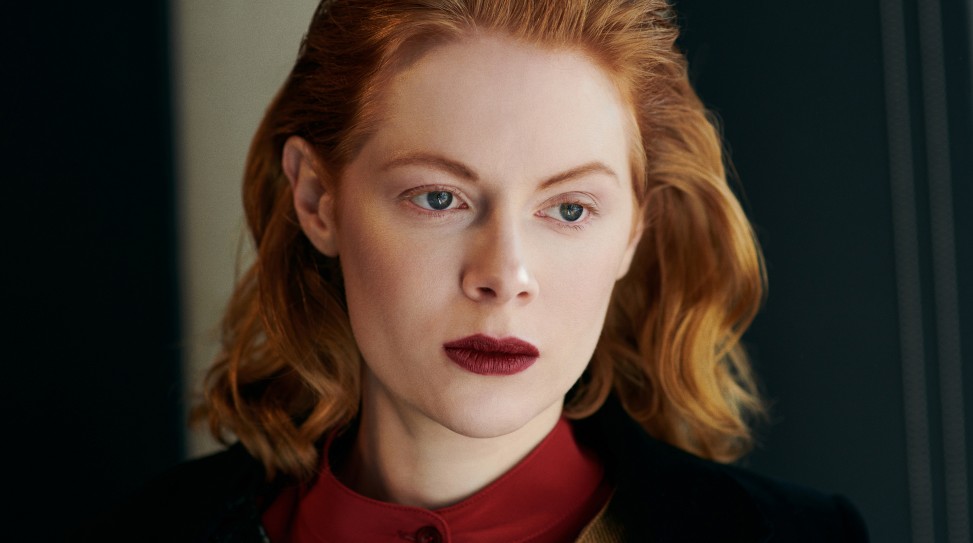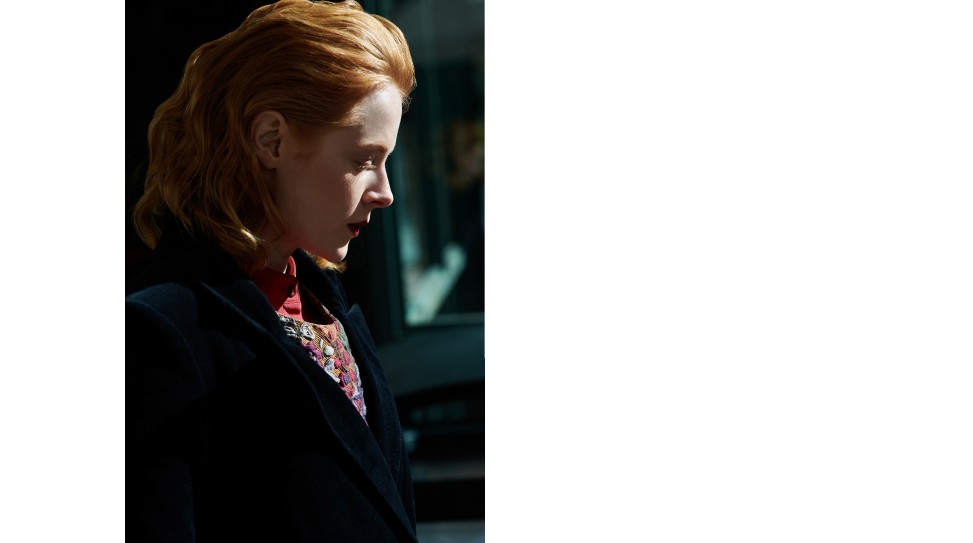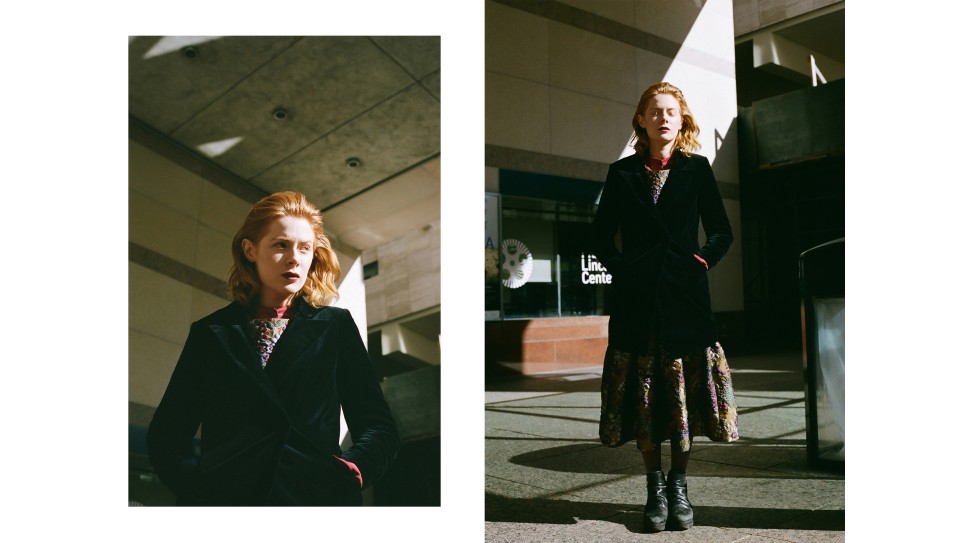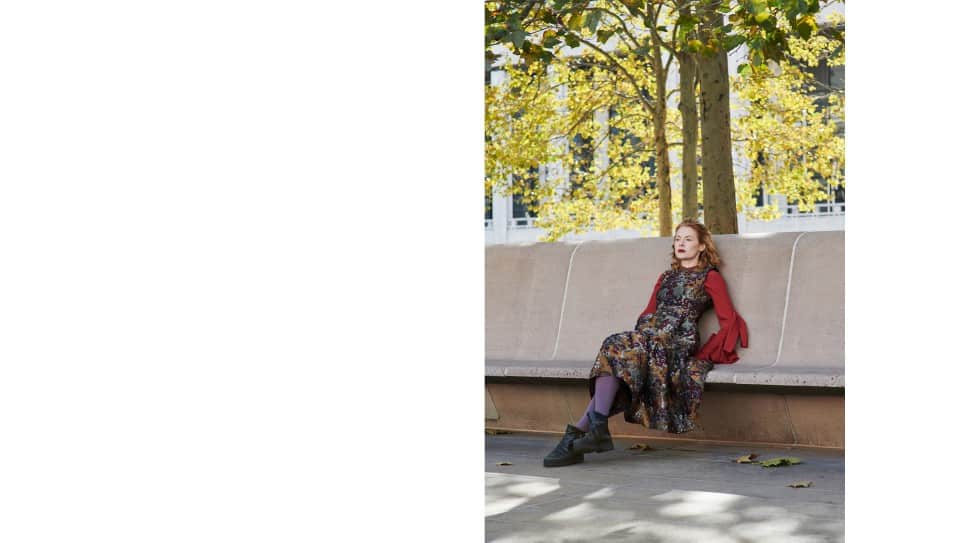People’s perspective on happiness is very personal to them. What one person considers happiness, another person wouldn’t. Everyone wants happiness, and what is that, really?
Photography by Matthew Cylinder
Makeup by Lisa Aharon @ The Wall Group
Hair by Rutger @ The Wall Group using Davines
Jessica Hausner’s Palme d’Or contender Little Joe, a sci-fi vision of novel imagination born out of presently relevant issues, is the latest in a long tradition of tales in which man plays God—here, a woman—and science crosses a rubicon. The Austrian filmmaker ruminates on our pharmaceutical-obsessed reality, and the film’s probing question—who can prove the sincerity of feelings in an overmedicated world?—is fascinating. Does being made happy artificially render us less human?
Set against the antiseptic glow of Planthouse Biotechnologies, Little Joe follows Alice (Emily Beecham), a geneticist whose promise at the research laboratory rests heavily on her latest creation. With the help of her closest colleague, Chris (Ben Whishaw), she has cultivated a new subspecies of plant with a very peculiar quirk. It emits via scent oxytocin, the hormone traditionally released in the brain to cement the bond between mother and baby, thereby invoking an increased state of happiness in its carer—so long as you provide it with optimal conditions, and speak to it regularly and affectionately. It’s horticultural Tamagotchi, only it cures depression instead of exacerbating it. Meanwhile, Alice faces scrutiny from other botanists, not least because her creation is suspected to be the cause of the wipeout of another experimental plant in the same greenhouse. They’re not wrong: We learn that she violated protocol in using an untested virus to limit her plant’s allergens.
Totally enamored with her creation, Alice brings one of the plants home to uplift her neglected school-age son, Joe (Kit Connor), going against yet another company policy. Our single mother protagonist has named the plant “Little Joe,” presumptively out of not only love but guilt. It’s clear that Alice struggles to maintain a functional work/life balance: We see her apologetically arriving home late with what appears to be a pattern of endless parade of high-end, gourmet takeout meals.
We go on to discover that not even a plant’s love is free. Rendered in unsettling vermillion—fittingly in the Pantone shade that poisonous animals have evolved towards to warn their predators of toxins—the flower turns out to paraticize the brains of all those who sniff its pollen, consequently and creepily altering their behavior and language. They’re not drooling vegetables, but rather chipper zombies interested only in the plant, which in turn is looking for future pathogenic hosts—a survival mechanism spawned in response to its genetically engineered sterility. As more and more people in her circle become infected, the underlying cause steadily erodes Alice’s grip on reality.
Presented with the Best Actress gong at this year’s Cannes Film Festival, Beecham is the true heart of the film, breathing into Alice a core human conflict with style, restraint, and nuance. The English actress has other movies on her docket, among them Craig Gillespie’s Cruella—a live-action prequel to 101 Dalmatians, which follows the Disney villainess—set for release in 2021.
Little Joe hits select theaters and On Demand on December 6.
I would love to take you back to the beginning stages of this project when you were first absorbing the script and studying your character. There’s ambiguity as to what’s really happening to Alice, at least initially, and that’s by design. Crucially, you wonder, is Alice exhibiting some sort of psychiatric disorder or are the people around her in fact turning into these “happy zombies” as Jessica [Hausner] has worded it? At Cannes, you had remembered the screenplay being “deliberately confusing.”
Right. I’d like to take the word “confusing” back. I’d like to say that it was open to interpretation. Cannes was all a bit of a sensory overload. I was in a state of shock throughout the entire festival. You shouldn’t entirely trust anything I said there. [laughs]
I can imagine it’s overwhelming to say the least.
It was very overwhelming, yes.
With all that’s open for interpretation, there must be a compulsion in actors to want to know the ABCs, beyond what’s on the page. What are the things you knew to be absolutely true?
We researched all of the scientific facts, so that’s all real and we understood that. We made sure to understand everything so it felt natural, and then it wasn’t anything we had to think about anymore. We were unconsciously competent about what we were talking about. But there were so many parts of the script where even Jessica and I are feeling it out throughout the entire film. Ben Whishaw and I were having a joke between us that sometimes you really can’t prepare before you do the scene. You just have to be really open for whatever Jessica is going to suggest. You really can’t preempt what she’s going to say. What you’re working with is a really unpredictable imagination and that’s why her films are so interesting. Her films are obviously their own genre and she really plays around with it. Alice at many points is in a state of confusion and paranoia. Her mind is constantly ticking away. She’s down this rabbit hole of not understanding if she should even trust herself, and of course science is a complex thing. Alice discovers something that she can’t quite grapple with and it’s also mixing with personal insecurities. I think Jessica has cleverly put those two together so Alice is in this mal equilibrium. She’s so paranoid. She’s insecure about her relationship with her son that’s shifting constantly. She’s someone who has always been much more comfortable in her work life because it’s something that she can control—Jessica and I definitely discussed that—and her romantic life is not something she takes seriously or wants to talk about because she’s so confident and has really dedicated every single moment of her life to her work. I think all of this starts to grow and all the lines start to blur for her. There are definitely scenes where Alice kind of believes what’s happening around her, but also doesn’t, and she’s at the same time laughing at herself sometimes. She often feels self-conscious or humiliated so there’s no ego, which we enjoyed talking about a lot. When Jessica and I first met, we discussed pride and power shifts and all of this stuff we found amusing and interesting and really observant. Jessica sees a lot of comedy within it. She’s got a great mind.
More often in filmmaking, directors strive to harness the most naturalistic performances from actors. But this is a stylized performance. Did you find that you were maybe engaging in way more conversations with Jessica because you’re aiming for not what you know to be believable in the real world and instead something more specific she has in mind?
Yes. There were times when I was a little bit nervous because sometimes it can really pull you out. It’s a challenge. It pulls you out of your comfort zone. Obviously as an actor I’ve been coached my whole life to be as open as possible and lean into my natural instincts as much as possible. Even though we wanted Alice to be real and instinctive, she’s also kind of deliberate, which is also true of the whole look of the film. There are deliberately artificial aspects of the film, like the neon colors. Some parts of Alice’s home look like a dollhouse.
I’ve been calling it the Gucci sheen.
Yes. All of these things I had to acknowledge as an actor. If you notice in Jessica’s other films as well, the performances are small and low-key. They’re not big and demonstrative. But it was also very choreographed so we’d do about 20 takes each and it would be very important to Jessica that the timing was very precise: the timing of the camera, the timing of the focus, the timing of an extra walking past, the timing of a look on a certain line whilst in synch with the camera panning in or out, and then the right information needs to get delivered. By design, even Alice is being artificial at times because she doesn’t really buy into it. You see that in the way she speaks to Joe. She struggles with it. So perhaps there’s a slight sense of inauthentic mess-about sometimes, but there’s always a shift happening between the characters. We’re constantly negotiating the dynamics in the subtleties. What could be a throwaway sentence to one character will actually play into the paranoia of another character. It’s all slightly internalized. Alice is very cerebral. Some people have mentioned that she’s “contained,” and I guess we never discussed it as contained, but it was also never in the script that Alice becomes large and emotional. There’s no climax to Alice at all. But that’s where it’s brilliant because Jessica is always wanting to do things differently. She was even talking about how she loves to pan past moments. Traditionally in films when the story becomes more tense, the camera pans in closer and closer. Jessica says she enjoys panning past the characters completely and missing the moment—panning really slowly towards the curtain.
I remember that moment well. I love how you say that Alice has no climax. Although all of this scary stuff is happening around her, she comes across as someone unafraid at her core, in the way that people of science can rationalize practically everything.
Yes. She’s a scientist and she’s very intellectual and she’s very responsible. She’s not going to suddenly start bawling or lose herself when she figures out that her plant has perhaps gone rogue, has become mutated, has become destructive, and she has to end it. She doesn’t flip out. She’s very cerebral about it. Those things were discussed. We also discussed women’s relationships to work and colleagues and their children. We discussed what Alice is juggling and the inner conflict she feels. She’s quite complicated. All the characters’ situations are complicated, but for her it’s quite internally so. It’s open to interpretation and that’s what real life is. Nobody walks around telling each other what their deep concerns are. We aren’t aware of what’s driving other people, really. People have interpreted the film very, very differently and taken completely different meanings out of it that we haven’t often discussed. It’s great that films stoke thoughts. It’s like an art piece in that respect, that you go and watch something and think about it and decide what to take from it. So often, films can be very passive. Sometimes, with a film like this, I think you have to engage yourself in a different way.
After watching this film, I looked into the very real psychiatric disorder called Capgras, the delusion that someone close to you has been replaced by an imposter. It’s endlessly fascinating to me. It’s maybe the scariest thing I can think of, right up there with our collective fear of losing our parents. The film also functions as a great commentary on the ubiquity of antidepressants and this implied ideal of permanent happiness as a standardized emotional norm we should all aspire to. We’re living in an overmedicated world, a heavily self-medicating world. Are these things you talked about as well?
It’s funny because that wasn’t something we ever really discussed very much actually. It’s something we have been discussing lately because, again, interpretation. People’s perspective on happiness is very personal to them. What one person considers happiness, another person wouldn’t. But yeah, it’s brought up now. Everyone wants happiness, and what is that, really?
I read that early in her research Jessica spoke to a biologist who told her that, from a scientific point of view, there is no fragrance that would make people feel happy. It is unlikely that we will find one for people. In terms of evolution, happiness is not an interesting trait. Because Alice is so stoic and sort of keeps to herself, I found myself wondering if she’s happy in her life and what kind of an upbringing she might’ve had. Do you like to imagine backstories for your characters?
I like to do it with the director because you want to be on the same page with each other. It’s a collaborative effort. Then once you’re on the same page, you do all the other stuff that they can’t contribute to, which is your own preparation and getting as comfortable as possible with it so that you can let go of it when you’re there on set and enjoy the filming experience. We did discuss lots of things like that, but mainly about Alice’s beliefs and what drives her. Jessica and I discussed somebody who really inspired Alice: a French microbiologist by the name of Emmanuelle Charpentier. She discovered this very revolutionary gene-editing process, CRISPR/Cas-9, which has potentially frightening repercussions and also some very amazing possibilities. Anyway, Emmanuelle in interviews discussed that she didn’t really have time for a personal life or hobbies. She just listened to music in her lab. She also wears lots of scarves. [laughs] I think she inspired the scarf in the movie. She comes across as almost a little bit shy, but she’s also very revered and respected obviously. She’s changed the shape of science with what she has done. So we were quite interested in her. She also has a small build like myself. We discussed a lot on set about the fact that Alice is very senior in the lab and how her male colleagues had to do what she said. That interferes with her and Chris’ relationship. There is quite a funny dynamic between the two of them. We really enjoyed Chris’ double cocky looks. That was a source of comedy for Ben and I.
You had hands-on training in a real lab, didn’t you?
We did!
You extracted DNA from a leaf.
That was really something special.
That must all add to your toolbox.
Yes. We got used to using the tools and, as I said before, it’s about trying to get it as unconscious as possible so that it becomes muscle memory. Then you can just ignore it because if you do what she does in the lab every day, it’s just like brushing your teeth. But to us, it’s very complex. They discussed gene editing and explained all of that to us, but then Ben and I had to go home and watch more videos because we were still confused. [laughs]
I mean, when the backdrop is something as specific and cerebral as genetic engineering, how much do you really want to know, right? Don’t you more trust that the writer and the director has done the bulk of the research already?
They [Hausner and Géraldine Bajard, the co-writer] did a lot of research. I’m saying this because I heard Jessica say it the other day. They spoke to a lot of scientists and neurologists. They did a lot of research before they wrote it. It’s a fascinating subject, it really is.
Now you’re on to something different altogether. Where are you currently with Cruella?
I’m literally starting actually. We’re shooting around London. I think it’s going to be good. It’s a lot of punk music and Vivienne Westwood-inspired costumes and animals and children and Emma Thompson and Emma Stone. A great combination.
It’s gearing up to becoming an event movie. It always feels too deliberate and predictable to end on a question like that so let me ask you this: Is there something you felt unsure about while you were training at the London Academy of Music and Dramatic Art all those years ago that you’ve been able to sort out in the intervening years?
Well, I was only 18 when I was there. Looking back, and knowing 18 year olds now, gosh, I believe it’s life experience that taught me more about acting. But it did give me the confidence on stage, although I never really went on stage very much. [laughs] Hopefully, I will in the future and utilize that through the years of my life. It also helped me to believe that I could possibly do this. Before I went, I really had no idea because I had no experience. Also, we have a great support network. I think my fellow students and I are like family now. We’ve all gone through so much and I think that’s really, really, really important for actors in this industry. You really have to support each other because it’s tough. And I understand myself. When you understand yourself and other people, then you can understand characters.





 A Conversation with Sean Wang
A Conversation with Sean Wang A Conversation with James Paxton
A Conversation with James Paxton
No Comments